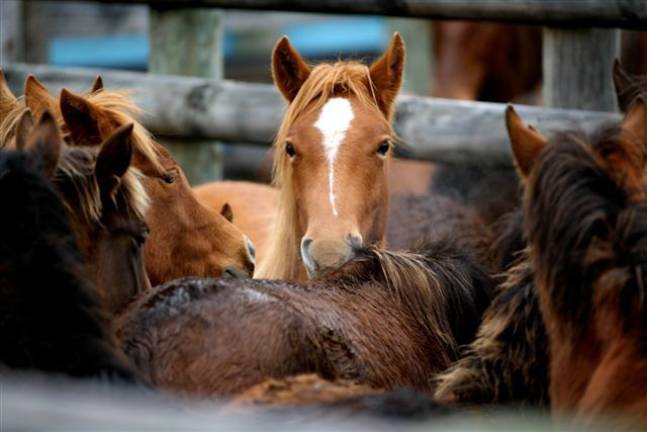Horse meat, anyone?

By Edie Johnson
Goshen — For many in the horse industry, this is the season of blue ribbons at the high-end dressage and jumper shows, thoroughbred and harness racing. But a darker underbelly of the horse industry recently brought to light has many equine enthusiasts fuming.
Due in part to the recent recession, horses have been going through auction houses in greater numbers than ever in our lifetime — most selling between $300 and $600. While some find loving homes thanks to groups of equestrian angels who devote themselves to publicizing their qualities and availability, a shocking number go to buyers known in equestrian circles as "the killers," who slaughter the animals for human consumption. Unless they are rescued at the last moment, unadopted horses are destined for New Mexico or Canada, where horse-slaughtering is practiced much the same as in the beef industry, and the resulting meat is sold as a delicacy. Slaughtering horses for meat has been illegal in this country since 2007, but recent federal legislation has paved the way for a New Mexico company to open the first American horse-processing facility since the ban was instated. Two more facilities are soon to open in Missouri and Iowa.
Kay Myruski, of Goshen's Brookfield Farm, has been instrumental as a member of a network of horse lovers trying to save these auction horses, rehabilitate them and find them new homes. She recently adopted four from an upstate farm owner who had saved over 30 horses only to realize she could not care for them. Rescue groups abound in the Hudson Valley where a nice find can become a good companion animal or, in many cases, a good competitor when they have completed rehabilitation.
Auctions are regularly held in Unidilla, New York; Cranbury, New Jersey; and New Holland, Pennsylvania.
Not For Human Consumption
In addition to the outcry over eating pets, many horse lovers, and the Humane Society of the United States, have declared the meat of U.S. horses unsafe to eat. The runoff from processing them has also found to be toxic. The large majority of auction horses have suffered from poor feeding, physical injuries or equine diseases. Many that aren't ill, undernourished or diseased have, at some point in their lives, been given a host of medications, such as worm preventives, phenylbutazzone (large horse aspirin), and prednisones — many of which state on their containers that they are not to be used on animals meant for human consumption.
Inhumane procedures spearhead objections
While many argue that the slaughter of horses should be banned based solely on their reverence, others cite humane issues as better reasoning. From the onset, the slaughter process has been found to be unusually cruel and inhumane. Injured and weak animals are packed tightly in trucks and live in a pile for hundreds of miles. Frequent stops for water or other care is often missing. In just the past six months, no less than three of these heavily loaded trucks had accidents, killing nearly all of the horses in each case. Two were by fire, the most recent caused by the driver flicking a cigarette into their hay.
Studies also show that horses do not always die quickly during the slaughter process. Much like cattle slaughter, a bolt-gun shot to the brain is used to kill or stun the horse before it is bled to death, which ensures death as well as begins the processing process.
BLM seen by some as friend, some as foe
While thousands of horses still roam the plains in the United States, the Bureau of Land Management (BLM) oversees their management. Many of the horses they round up each year from overgrazed parcels (needed by the cattlemen) go to placement auctions and find loving homes. Some end up with famed careers, and some with famed owners. Willie Nelson has adopted 50 such animals. T. Boone Pickens and his wife, Madeleine, of Texas green energy fame, have rescued roughly 600 wild horses and mustangs.
Some, however, question the BLM's round-up process. "What happens to those that do not find adopters?" they ask. Objections have also been raised regarding the safety of helicopter roundups — a recently publicized foal with a broken leg being just one such example.
Similar concerns have been raised about the wild horses of Alberta, Canada and various parts of Australia, where drought has recently caused death and starvation. With available land dwindling, it remains a huge challenge to find and put aside sufficient grazing land for these horses. Many are working to overcome this challenge, others are comfortable selling the beasts as meat.
USDA ruling may be temporary. Humane Society suing to make sure it is
This week, horse lovers following the roller-coaster debate over slaughter were relieved when the USDA issued a statement saying that while they were required by law to lift the ban when the seven-year ruling elapsed, President Obama has pushed for Congress to pass new legislation that will restore the ban. In case they falter, the Humane Society of the United States has filed a lawsuit against them for allowing the processing of meat that is clearly "not fit for human consumption," whether in the United States or elsewhere. The lawsuit further claims that toxic runoff not only has caused pollution in the past, but the toxic chemicals the horses may have ingested may be in the runoff as well. There is currently no system for tracking equine medication in the United States.
For more on the plight of these horses, listen to this past week's CBS documentary by August Skamenca.
Click here to jump to the documentary: https://soundcloud.com/cbs-radio-news/horse-slaughter-investigation